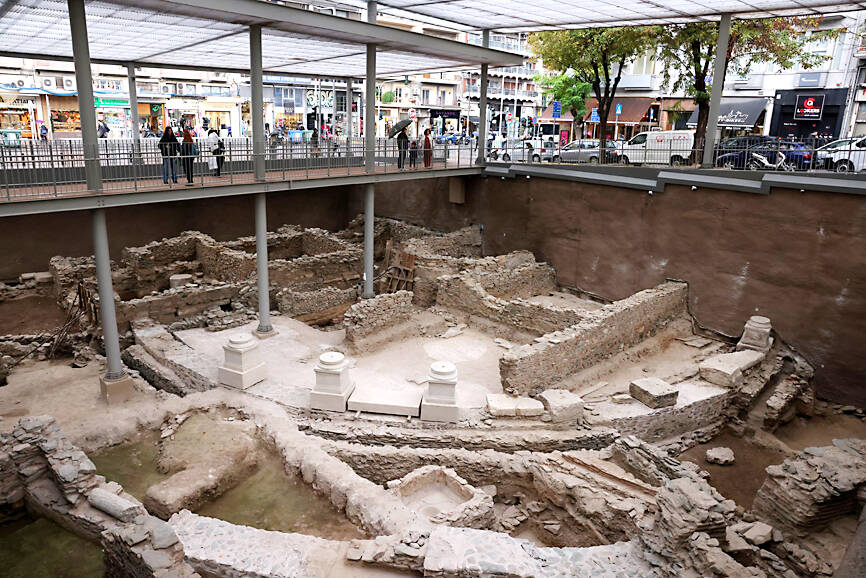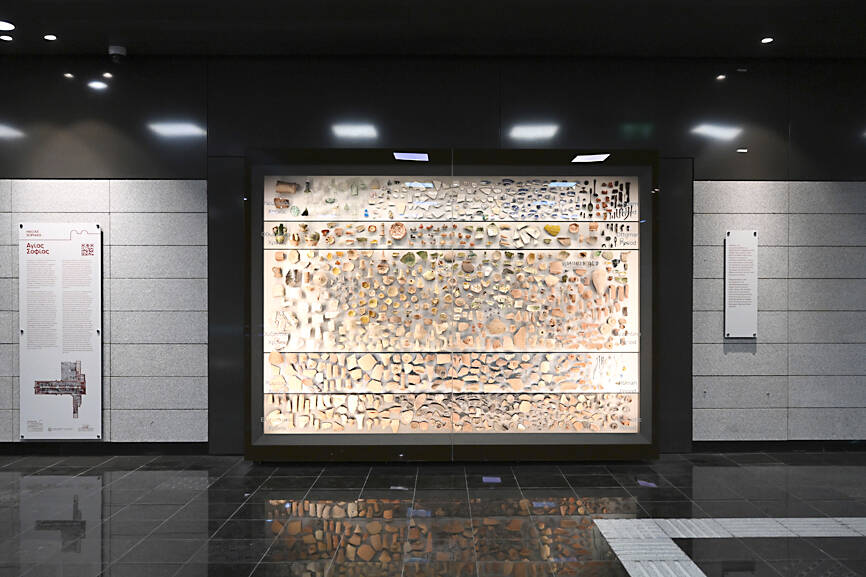It caused untold commotion, decades of disruption and — among historians and archeologists — controversy and despair, but at midday on Saturday, the antiquities-rich subterranean world of Thessaloniki opened to a world of driverless trains and high-tech automation with the inauguration of its long-awaited subway.
The excitement on the streets of the northern Greek port city is almost palpable. “Archaeologically, it has been an extremely complex and difficult endeavor,” said Greek Minister of Culture, Education and Religious Affairs Lina Mendoni of the more than 300,000 finds made since construction began 22 years ago. “To get here required a battle on many fronts.”
The discovery of treasures never before seen — many to be exhibited in the stations themselves — promises a modern ride through the multilayered history of a metropolis that dates back 2,300 years and through which the Romans, Byzantines and Ottomans all passed.

Photo: Reuters
Two marble squares, an early Christian basilica, a Roman-era thoroughfare, water and drainage systems, and ancient Greek burial sites brimming with jewellery and gold are among the trove.
Signature pieces are showcased in the 13 “archeo-stations” opened in central Thessaloniki last weekend. More would be added when a second line is completed next year.
“What you see offers a remarkable blend of the ancient and modern, integrating archeological heritage with metro infrastructure,” Greek Minister of Infrastructure and Transport Christos Staikouras told reporters last month.

Photo: AP
As part of the carefully orchestrated inauguration, an “entire archaeological site” kept under wraps was unveiled for the first time at the central Venizelou station on Saturday.
After touring the site with a delegation of officials, including Greek President Katerina Sakellaropoulou, Greek Prime Minister Kyriakos Mitsotakis said: “I think that when the people of Thessaloniki have the chance, tomorrow, to see this station they will recognize the huge effort that has been put in so that the city could have antiquities and a metro.”
The fully automated rapid transit system — the first of its kind in Greece — is expected to serve more than 250,000 passengers a day, reducing traffic congestion by as many as 60,000 vehicles.
The underground’s complex engineering explains why, at least initially, it would only run along a 10km track, spawning complaints over the network’s limited reach — an extension to the city’s international airport eight miles away is planned for 2040.
Not since the Athens subway system was inaugurated almost 25 years ago has an infrastructure project of such scale or significance been undertaken in Greece.
The subway was originally scheduled for completion in 2012.
From the outset, the problem-plagued public project not only brought mayhem to Thessaloniki’s most central district, but became symbolic of government ineptitude and what local people viewed, more generally, as the disregard with which officials treated the country’s northern capital.
The unearthing of so many artefacts forced engineers and archaeologists to collaborate closely in what became one of Greece’s biggest and most controversial excavations.
Metro tunnels had to be dug at least 20m deep to preserve finds nearer the surface while architects were compelled to return to their drawing boards to redesign stations as treasures were discovered.
The delays and additional financial demands of a transport network that has already cost 3 billion euros (US$3.17 billion) have spurred the Greek culture ministry to describe the project as the “biggest salvation work” ever carried out in Greece.
Not all agree. Echoing the consternation of some fellow historians, Angelos Chaniotis, professor of ancient history and classics at Princeton University, bemoaned what he said were treasures “sliced horizontally and vertically” before being “stitched together, like a puzzle” to accommodate the subway.
Far from being a cause for jubilation, construction of the subway had “undermined the authenticity of the antiquities and does not justify celebrations,” he wrote in an op-ed published in the more usually pro-government Kathimerini newspaper.

A Chinese scientist was arrested while arriving in the US at Detroit airport, the second case in days involving the alleged smuggling of biological material, authorities said on Monday. The scientist is accused of shipping biological material months ago to staff at a laboratory at the University of Michigan. The FBI, in a court filing, described it as material related to certain worms and requires a government permit. “The guidelines for importing biological materials into the US for research purposes are stringent, but clear, and actions like this undermine the legitimate work of other visiting scholars,” said John Nowak, who leads field

Swedish campaigner Greta Thunberg was deported from Israel yesterday, the Israeli Ministry of Foreign Affairs said, the day after the Israeli navy prevented her and a group of fellow pro-Palestinian activists from sailing to Gaza. Thunberg, 22, was put on a flight to France, the ministry said, adding that she would travel on to Sweden from there. Three other people who had been aboard the charity vessel also agreed to immediate repatriation. Eight other crew members are contesting their deportation order, Israeli rights group Adalah, which advised them, said in a statement. They are being held at a detention center ahead of a

‘THE RED LINE’: Colombian President Gustavo Petro promised a thorough probe into the attack on the senator, who had announced his presidential bid in March Colombian Senator Miguel Uribe Turbay, a possible candidate in the country’s presidential election next year, was shot and wounded at a campaign rally in Bogota on Saturday, authorities said. His conservative Democratic Center party released a statement calling it “an unacceptable act of violence.” The attack took place in a park in the Fontibon neighborhood when armed assailants shot him from behind, said the right-wing Democratic Center, which was the party of former Colombian president Alvaro Uribe. The men are not related. Images circulating on social media showed Uribe Turbay, 39, covered in blood being held by several people. The Santa Fe Foundation

NUCLEAR WARNING: Elites are carelessly fomenting fear and tensions between nuclear powers, perhaps because they have access to shelters, Tulsi Gabbard said After a trip to Hiroshima, US Director of National Intelligence Tulsi Gabbard on Tuesday warned that “warmongers” were pushing the world to the brink of nuclear war. Gabbard did not specify her concerns. Gabbard posted on social media a video of grisly footage from the world’s first nuclear attack and of her staring reflectively at the Hiroshima Peace Memorial. On Aug. 6, 1945, the US obliterated Hiroshima, killing 140,000 people in the explosion and by the end of the year from the uranium bomb’s effects. Three days later, a US plane dropped a plutonium bomb on Nagasaki, leaving abut 74,000 people dead by the